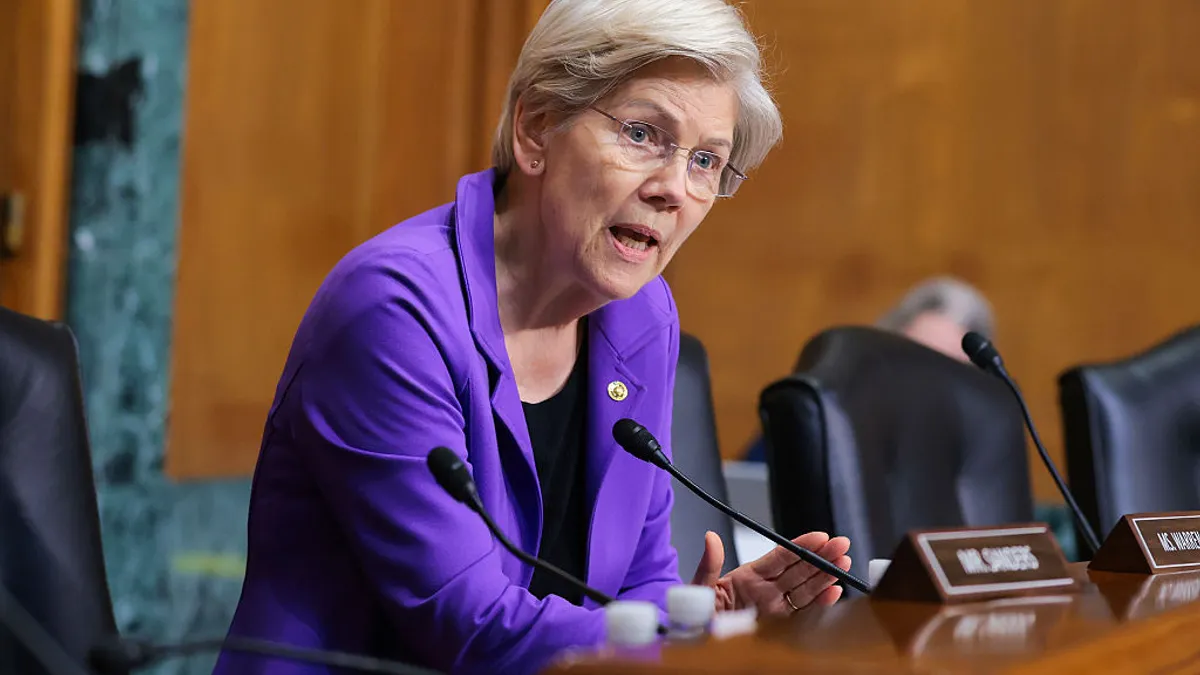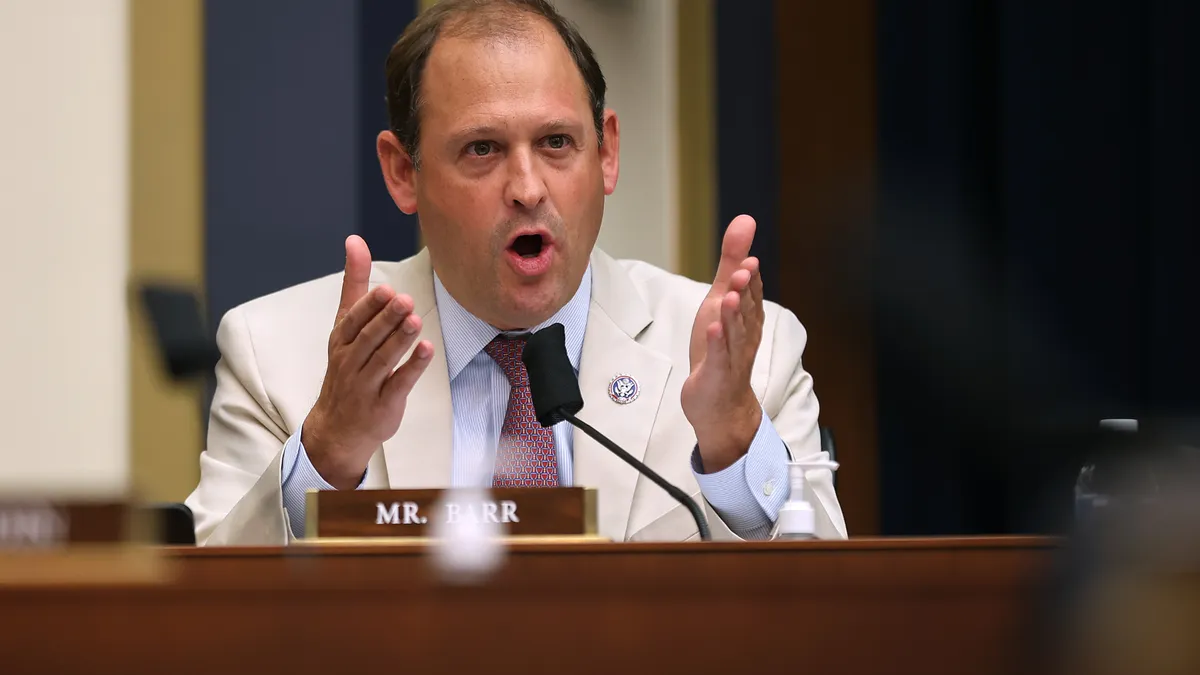The Consumer Financial Protection Bureau’s supervision director, Lorelei Salas, and enforcement director, Eric Halperin, signaled their intent to resign Tuesday, according to emails seen by CNBC, Reuters and Bloomberg Law.
“The Bureau has been instructed to stand down,” Salas wrote. “I do not believe it is appropriate, nor lawful, to stop all supervisory activities and examinations, and I cannot longer serve as the Supervision Director.”
The stand-down order is a reference to an email the bureau’s newly minted acting chief, Russ Vought, sent Monday morning.
“Please do not perform any work tasks,” he wrote in an email to employees. “If there are any urgent matters, please alert me through Mark Paoletta, Chief Legal Officer, to get approval in writing before performing any work task. Otherwise, employees should stand down from performing any work task.”
Paoletta followed up with an arguably more ominous message in a Monday email to enforcement staff.
"The acting director is implementing new enforcement priorities. Implementation of past priorities is to cease immediately,” Paoletta wrote, according to American Banker and The Wall Street Journal. “Failure to abide by these instructions constitutes insubordination and we will take appropriate personnel action.”
In his email, Paoletta instructed enforcement employees “not [to] make any further communications, including phone calls and emails to parties that are subject to any pending enforcement matter or prospective enforcement matter without getting my approval in writing."
Halperin, the CFPB’s enforcement chief, cited the directives from the bureau’s new leadership in his email.
"As you know we have been ordered to cease all work. I don’t believe in these conditions I can effectively serve in my role, which is protecting American consumers,” Halperin wrote. “Today I made the difficult decision to resign.”
What exactly is a ‘work task’?
The extent of what constitutes a “work task” as termed by Vought, was vague, prompting bureau employees to consult their department leaders or take to encrypted chat apps and an instant-message platform run by the CFPB’s union, asking whether they were allowed to talk to one another over Microsoft Teams, or read their email or complete required online training programs.
Paoletta did not respond to requests for comment.
There was no public announcement that Paoletta had been named to a position at the CFPB – usually, acting general counsel. (The CFPB’s previous legal chief, Seth Frotman, stepped down last week.) But Paoletta, the general counsel at the Office of Management and Budget – which Vought also directs – has a CFPB email address.
The Monday directives came two days after Vought instructed CFPB employees to cease “all supervision and examination activity” and “all stakeholder engagement,” and to stop work on all proposed or final rules, enforcement, investigations, settlements and formal or informal guidance. Employees based at the CFPB’s Washington headquarters were ordered Sunday to work remotely through Feb. 14 as representatives of the Elon Musk-led Department of Government Efficiency continued their assessment of the agency’s operations.
‘Bank robber’
Outside CFPB headquarters, roughly 600 people, including 17 lawmakers – by event organizers’ count – attended a rally Monday in support of the bureau.
Attendees held signs that read, “Nobody Elected Elon!” and chanted slogans that ranged from basic (“Let us work”) to wonky ("1234, consumers are worth fighting for, 5678, Dodd-Frank is pretty great.")
The thrust of the rally’s energy focused on Musk and what CFPB advocates presume is an effort to “delete” the agency – incidentally at a time when the Musk-owned social media platform X aims to launch a digital payments tool with card network Visa.
“This is like a bank robber trying to fire the cops and turn off the alarms just before he strolls into the lobby,” Sen. Elizabeth Warren, D-MA, the CFPB’s architect, said at Monday’s rally. “Congress built [the CFPB], and no one other than Congress – not [President] Donald Trump, not Elon Musk, no one – can fire the financial cops.”
‘Trauma’
The CFPB cannot be closed without congressional action. But Vought’s move to cripple the agency’s mission tracks with comments he made in 2023 to the Center for Renewing America, specifically referencing the Environmental Protection Agency.
“We want the bureaucrats to be traumatically affected,” Vought said in videos obtained by ProPublica. “When they wake up in the morning, we want them to not want to go to work because they are increasingly viewed as the villains. We want their funding to be shut down so that the EPA can’t do all of the rules against our energy industry because they have no bandwidth financially to do so. We want to put them in trauma.”
Asked Monday in the Oval Office whether his goal is to eliminate the CFPB, Trump spoke in the past tense.
“We did the right thing. That was a very important thing to get rid of,” Trump said in a video captured by American Banker. “That was a bad group of people running it.”
Trump said the agency “was set up to destroy people,” and added his administration targeted it as a source of “waste, fraud and abuse.”
Richard Cordray, the Obama-era CFPB director, said he thinks Vought’s stop-work order is illegal.
“President Trump and his people, many of whom are not even properly members of the government, are taking a wrecking ball to our government,” Cordray told The New York Times. “He dislikes the law, and he’s trying to ignore it and act as though it doesn’t exist.”
To that end, the National Treasury Employees Union, which represents CFPB employees, filed two lawsuits Sunday in a federal court in Washington – one to block Vought’s directives and another urging a judge to keep DOGE from accessing employee records.
CFPB employees have been “placed in questionable status as they have been directed not to work but they have also not been formally placed on any authorized type of leave,” legal representation for the union wrote in one of the suits, seen by American Banker and The Wall Street Journal.
"It is substantially likely that these initial directives are a precursor to a purge of CFPB's workforce, which is now prohibited from fulfilling the agency's statutory mission," the suit states.
The CFPB has filed lawsuits in the past two months against lenders such as JPMorgan Chase, Capital One and Comerica. The agency could potentially withdraw those suits, but such action would have to be approved by a judge.
A halt to the bureau’s enforcement actions – if it sticks – wouldn’t “exactly turn the clock back to 2010,” before the agency was established, Casey Jennings, a partner at Seward & Kissel and former CFPB attorney, told Reuters.
If anything, Jennings said, “this kind of balkanizes enforcement," potentially moving more activity to the state level.
David Super, a professor of law and economics at Georgetown University, told Reuters the stop-work order “creates uncertainty for businesses who were used to operating under a particular regulatory environment,” adding they “may get undercut by competitors with lower ethics that are willing to act more ruthlessly.”
Rep. Ayanna Pressley, D-MA, another speaker at Monday’s rally, noted work the CFPB has done to cap overdraft fees, stop scammers engaging in elder abuse and curb lending discrimination.
“This is what [DOGE is] gonna dismantle?” she said. “What in the hell kind of ‘government efficiency’ is that?”























